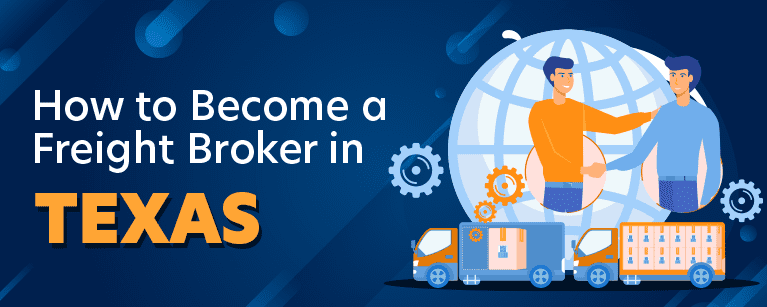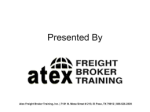
Not that they’d brag on it, but it’s true:
Texas holds more miles of highways, byways, roads, and paths than any other state in the lower 48.
Texas highways see more than 1.2 billion tons of freight in transit annually.
Like everything else constructed in Texas, the transportation industry is built on a heroic scale.
Oh, and did we mention modest?
Fun Fact:
One out of every 16 Texas residents works in the trucking profession.
Table of Contents
- Freight Broker Duties in Texas
- Skills for freight brokers
- Licensing Requirements to Become a Texas Freight Broker
- Freight Broker Programs in Texas
- Training Options for Freight Movers Schools in Texas
- Freight Brokers Schools in Texas – Summary Table
- Salary
- Frequently Asked Questions
- Freight Broker Info by State
Freight Broker Duties in Texas
What do freight brokers do?
Great question! Freight brokers supervise the transport of shipments, including locating a qualified carrier, arranging a reasonable price, and keeping the shipper advised on the shipment status.
Skills for freight brokers
Cultivating freight broker skills can help enhance client interactions and relationships, business colleagues’ associations, and improve earnings.
Communication skills:
Freight may be a great career fit if you enjoy meeting new people and negotiating.
However, be aware that part of the job is meeting the challenge of being called upon to handle several clients simultaneously.
Communication skills are vital, so expect to spend much of your workday on phone calls, texts, and emails with shippers and carriers.
Organizational skills:
Because freight brokers work with several clients simultaneously, you must have excellent organizational skills in maintaining files and coordinating shipments.
Customer care:
As a freight broker, you can expect to spend considerable time communicating with shippers and carriers.
Excellent customer relations help maintain rapport and ensure customers have a great experience that fulfills their transit shipping needs.
Active listening, negotiation, and mediation skills:
You may want to negotiate with shippers and carriers to find a price both parties approve.
Technology management:
Learn and keep up with spreadsheets and logistics software for organized and efficient customer data.
Mastering technology and keeping up with continual advances can help you complete your tasks and troubleshoot valuable skills in your career as a freight broker, whether you prefer to work solo as an independent broker or as part of an established brokerage firm.
As the liaison or the go-between between the shipper (the individual or organization that makes owns the product) and the trucking company that hauls the freight, freight brokers perform a valuable service for both sides of the business interaction.
However, they don’t engage in the function of an actual motor carrier.
Instead, they arrange for the transport of goods.
Think of them as a facilitator between interested parties!
Licensing Requirements to Become a Texas Freight Broker
In Texas, a high school degree or equivalency is the primary educational attainment level to enter the field of freight brokers.
However, it may be helpful to go through a training program to acquire the theory, skills, confidence, and overview of the profession to attain both an entry point into the field and the skills and approach to be a successful freight broker in Texas.
While it’s not required, many freight brokers benefit from a broker course before applying with the Federal Motor Carrier Safety Administration, or the FMCSA, for a freight broker license.
When it comes to broker courses, there are many providers; choose from online-only, in-person, and home-study courses designed to help students comprehend the business basics of freight brokerage.
Freight Broker Programs in Texas
In Texas, there’s no requirement to complete a freight brokerage course before starting in the field.
However, while it’s not a requirement, completing a course or program can help you get a feel for the profession, see if it’s a good fit, develop a professional overview, and acquire the skills and techniques for business success.
For example, you can learn industry terminology and how to navigate brokerage software.
Training Options for Freight Movers Schools in Texas
Here are three sample educational programs that can help prospective freight brokers in Texas.
Brook Transportation Training Solutions
Online course, introductory to advanced, that provides help with website templates, transportation directory, and license filing assistance.
Freight Movers School
Online and in-person classes support you in learning about the transportation field and getting the resources to help new brokers get licensed in Texas.
Atex Freight Broker Training
Learn in-person online, or email home study via instructor support.
Freight Brokers Schools in Texas – Summary Table
| School Name | Address |
|---|---|
| Brook Transportation Training Solutions | 120, 5005, 5005 Colleyville Blvd #120, Colleyville, TX 76034, United States |
| Freight Movers School | |
| Atex Freight Broker Training | 5981 N Mesa St #920045, El Paso, TX 79902, United States |
Salary
A freight broker agent’s salary ranges between $32,455 and $36,655.
The average annual salary is $34,537.
Considerations include the location of the city or town, education level, skills, certifications, and professional experience.
Annual Salary Range:| Location | Avg. Annual Salary |
|---|---|
| Houston | $48,918 |
| Dallas | $47,764 |
| San Antonio | $46,365 |
| Austin | $47,283 |
| El Paso | $42,051 |
| Fort Worth | $46,846 |
| Arlington | $46,769 |
| Corpus Christi | $45,124 |
| Plano | $47,764 |
| Garland | $47,764 |
Regional Salary in Texas
| Region | Employed | Avg. Annual Salary | Avg. Hourly Pay | Top 10% Annual Salary | Bottom 10% Annual Salary |
|---|---|---|---|---|---|
| Amarillo, TX | 50 | $50,140 | $24.11 | $67,410 | $33,710 |
| Austin-Round Rock, TX | 230 | $50,170 | $24.12 | $80,150 | $32,640 |
| Beaumont-Port Arthur, TX | 30 | $55,940 | $26.9 | $75,020 | $37,190 |
| Brownsville-Harlingen, TX | 130 | $41,570 | $19.99 | $67,410 | $24,830 |
| Corpus Christi, TX | 40 | $54,430 | $26.17 | $75,610 | $37,860 |
| Dallas-Fort Worth-Arlington, TX | 3,770 | $48,020 | $23.09 | $68,750 | $35,200 |
| El Paso, TX | 330 | $40,400 | $19.43 | $57,920 | $24,350 |
| Houston-The Woodlands-Sugar Land, TX | 3,440 | $48,640 | $23.38 | $65,000 | $33,990 |
| Laredo, TX | 840 | $38,930 | $18.72 | $58,490 | $28,750 |
| Lubbock, TX | 70 | $47,890 | $23.02 | $65,900 | $32,950 |
| McAllen-Edinburg-Mission, TX | 120 | $40,460 | $19.45 | $68,300 | $28,080 |
| San Antonio-New Braunfels, TX | 270 | $51,690 | $24.85 | $74,330 | $30,380 |
* Employment conditions in your area may vary.
Frequently Asked Questions
What do I need to get started as a freight broker in Texas
To get your freight broker license in Texas, you’ll need an MC number, FMCSA license, insurance, and surety bond.
How can I get to be a freight broker in Texas?
Visit the Federal Motor Carrier Safety Administration’s website, and move along the road toward becoming a Texas freight broker.
What does the Texas market for freight brokers look like going forward?
The economic outlook for freight brokerages shows demand growing, just as it’s moved the freight brokerage industry in recent years.
The increased demand supports freight brokers in adding value through improved customer service and cost-saving steps.
Freight Broker Info by State
- Alabama
- Alaska
- Arizona
- Arkansas
- California
- Colorado
- Connecticut
- Delaware
- Florida
- Georgia
- Hawaii
- Idaho
- Illinois
- Indiana
- Iowa
- Kansas
- Kentucky
- Louisiana
- Maine
- Maryland
- Massachusetts
- Michigan
- Minnesota
- Mississippi
- Missouri
- Montana
- Nebraska
- Nevada
- New Hampshire
- New Jersey
- New Mexico
- New York
- North Carolina
- North Dakota
- Ohio
- Oklahoma
- Oregon
- Pennsylvania
- Rhode Island
- South Carolina
- South Dakota
- Tennessee
- Texas
- Utah
- Vermont
- Virginia
- Washington
- West Virginia
- Wisconsin
- Wyoming









